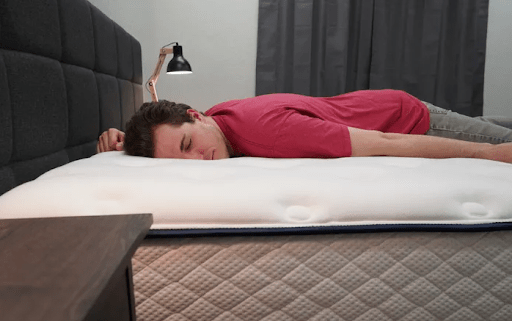In today’s fast-paced world, getting a good night’s sleep has become a challenge for many. Whether due to stress, unhealthy habits, or the wrong sleep environment, poor sleep quality is affecting millions of people globally. However, improving sleep quality doesn’t have to be complicated. By making informed choices, you can significantly enhance your sleep and, as a result, your overall health and wellness. One key element to consider is finding the right sleep support. This article will explore practical steps to help improve sleep quality through lifestyle adjustments, sleep environment changes, and selecting the best sleep products.
1. Create a Consistent Sleep Schedule
One of the most effective ways to improve sleep quality is by establishing a consistent sleep routine. Going to bed and waking up at the same time every day helps regulate your body’s internal clock, making it easier to fall asleep and wake up naturally. This consistency supports healthy circadian rhythms, which play a significant role in determining sleep quality.
It’s also essential to prioritize sleep and avoid distractions before bed. Try to eliminate any sources of disruption, such as electronic devices, bright lights, or loud noises, which can interfere with your ability to fall asleep. Aim to wind down about 30 minutes before bed with calming activities, such as reading, meditation, or listening to soothing music.
2. Improve Your Sleep Environment
The quality of your sleep environment can significantly impact how well you sleep. Make sure your bedroom is a sanctuary for rest by following these tips:
- Temperature: Keep your bedroom cool, ideally between 60-67°F (15-20°C), to promote restful sleep. A cooler environment signals your body that it’s time to rest.
- Noise: Consider using earplugs, a white noise machine, or a fan if you’re in a noisy environment. Reducing noise helps your mind stay relaxed throughout the night.
- Lighting: Keep your bedroom dark to enhance melatonin production, the hormone responsible for regulating sleep. Use blackout curtains or an eye mask to block out any light that might disrupt your sleep.
- Comfort: Comfort is crucial, and this is where finding the right sleep support comes into play. Your mattress, pillow, and sheets should be supportive and comfortable enough to help you sleep soundly. The right bedding materials, such as soft, breathable fabrics, also contribute to a comfortable and restful environment.
3. Prioritize the Right Sleep Products
The products you choose to support your sleep can make a huge difference. Finding the right mattress and pillow that suit your sleep style and provide adequate support is essential for quality sleep. Here’s how to choose the best sleep products:
- Mattresses: A good mattress provides proper spinal support and aligns your body in a neutral position to prevent discomfort. Depending on your sleeping position (side, back, stomach), choose a mattress with the right firmness to support your body’s unique needs. Memory foam and hybrid mattresses are popular choices for those seeking pressure relief and a personalized fit.
- Pillows: A pillow that suits your sleep position can prevent neck and back pain. Side sleepers generally benefit from thicker, firmer pillows, while back sleepers may prefer a medium-firm pillow. Stomach sleepers typically need a thinner pillow to avoid neck strain.
- Bedding: High-quality sheets made from natural fibers such as cotton or linen can help regulate body temperature, preventing overheating during the night. Consider switching to breathable, moisture-wicking fabrics if you tend to get too warm while sleeping.
4. Watch What You Eat and Drink
The foods and beverages you consume throughout the day can directly affect your sleep quality. Caffeine, alcohol, and heavy meals close to bedtime can disrupt your ability to fall asleep. Here’s how to make better choices:
- Caffeine: Avoid consuming caffeine late in the afternoon or evening. Caffeine is a stimulant that stays in your system for several hours, making it difficult for you to relax and sleep well.
- Alcohol: While alcohol may help you fall asleep initially, it disrupts the sleep cycle, leading to poor-quality sleep and frequent waking throughout the night.
- Heavy Meals: Eating large meals close to bedtime can cause indigestion and discomfort, which interfere with sleep. Opt for lighter meals in the evening and allow at least 2-3 hours before bed to digest.
Some foods, however, may support better sleep. Foods rich in magnesium, such as leafy greens, nuts, and seeds, have been linked to improved sleep quality. Additionally, foods containing tryptophan (like turkey and yogurt) can promote the production of serotonin, which helps regulate sleep patterns.
5. Stay Active During the Day
Regular physical activity can promote deeper, more restful sleep. Aim for at least 30 minutes of moderate exercise most days of the week. Activities like walking, swimming, cycling, and yoga can help reduce stress and anxiety, making it easier to fall asleep.
However, avoid vigorous exercise too close to bedtime, as it can elevate your heart rate and make it harder to relax. Morning or afternoon workouts are ideal for enhancing sleep quality without affecting your ability to fall asleep.
6. Manage Stress and Anxiety
Stress and anxiety are major culprits of poor sleep. When you’re anxious, your mind remains active, making it difficult to wind down and fall asleep. Incorporating stress-management techniques into your daily routine can improve your sleep quality. Some strategies include:
- Meditation and Deep Breathing: Practicing mindfulness, meditation, or deep breathing exercises can calm your mind and help you relax before bed.
- Journaling: Writing down your thoughts or worries before bed can help clear your mind and reduce anxiety, allowing you to rest better.
- Progressive Muscle Relaxation: This technique involves tensing and relaxing different muscle groups in your body to relieve physical tension and encourage relaxation.
7. Consider Natural Sleep Aids
If you’re still having trouble sleeping despite making lifestyle changes, you may want to consider natural sleep aids. Herbal teas, such as chamomile or valerian root, have calming properties that can help prepare your body for sleep. Additionally, supplements like melatonin or magnesium can support sleep without the risks associated with pharmaceutical medications.
Before using any supplements, it’s important to consult a healthcare professional to ensure they’re safe for you and won’t interact with other medications you may be taking.
Conclusion
Improving sleep quality is essential for overall health and wellness. By making mindful choices in your daily habits, creating a restful sleep environment, and prioritizing the right sleep support products, you can significantly enhance your sleep. Remember, everyone’s sleep needs are different, so finding the best solutions for your body and lifestyle is key. Start with small changes, and over time, you’ll notice a profound improvement in both your sleep and your overall health.
By following these tips and making the right choices, you can unlock the benefits of restorative sleep and enjoy better health, energy, and wellness every day.



